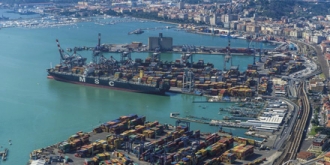Search Company:

The nation is headed for an economic upturn.
Over the past few years the Apennine Peninsula’s officials have made an effort to improve the overall framework for doing business, which has helped logistics too. The domestic transport industry’s positive outlook for 2016 is also down to national structural reforms.
Some countries have good reason to be envious of recent developments in Italy: economists say that after a long depression the nation is headed for an economic upturn. Not many appreciate that Italy is the third-largest economy in the euro zone and that it experienced economic growth for the first time since 2011 last year.
The important news that will have an impact on prospects in the logistics sector in the coming year is that there is expected to be a revival of exports due to the weak euro, and that imports will also rise again. According to national estimates, gross domestic product is set to rise by 1.5% in 2016. The three sectors which are expected to benefit most are mechanical engineering, vehicle production as well as logistics.
Nothing comes from nothing
The term reform does not necessarily evince much confidence these days, yet there is no doubt that reforms have contributed to the success Italians have achieved. The sale of 40% of the government’s stake in the Italian post office in 2015 raised EUR 3.35 billion for state coffers and attracted diverse international investors to Italy, including the China Investment Corporation (CIC) and George Soros.
In 2016 there will be a repeat performance, when the Italian state railway company Ferrovie dello Stato, which got a new chief executive officer in December, looks for investors. Following the example of the postal services the railways will sell 40% of the state’s shares. Railfreight is also going to be partially privatised in this move (see page 33, and ITJ 47-48 / 2015, Italy Special, pages 8–9).
A question of prestige
The reputation of Italian logistics companies abroad is a very important factor. Many experienced industry hands believe that it takes up to fifteen years until international shippers and shipowners register the progress made by service providers in the logistics sector. Ports have been especially affected by these problems of perception. Many hub operators complain that it took years of peaceful labour relations, or improved customs clearance procedures, for example, before they could reap the results of their efforts. The conclusion they draw is that not only must they work harder to attract international customers, but the Italian port sector as a whole must strengthen the quality of its services, so that it can compete with western and northern European ports.
Government port reforms in Italy have focused on this aspect. In Savona at the end of last year infrastructure and transport minister Graziano Delrio emphasised the fact that the main stumbling block to greater efficiency is the fragmented nature of Italian port infrastructure, as well as port authorities’ overly bureaucratic approach. «Why don’t we just consider the western Liguria region as a single port with many docks?» Delrio asked.
There are plans for closer cooperation between ports, for example between Genoa and Savona, or La Spezia and Carrara. New administrative structures should be based more on Italy’s economic regions and the corridors of the EU’s Trans-European Networks (TENs). There is still some way to go before a mental breakthrough happens however. The country also needs to make substantial investments in infrastructure, in order to improve the country’s ability to compete. According to the Italian ports association Assoporti’s estimates the efforts will require EUR 3 billion. Read more
Source: ITJ




